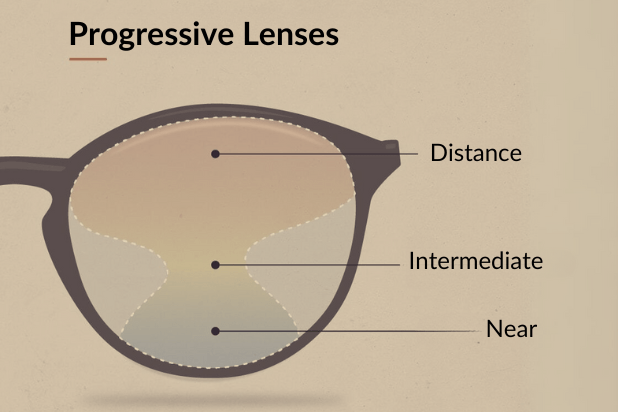Best Progressive Lenses for Astigmatism

Finding a solution for those with presbyopia and astigmatism requires a specialized approach, and progressive lenses have emerged as the best option for addressing these complex vision challenges. Astigmatism, an irregular curvature of the cornea or lens, can often make it difficult for the patient to have crisp and clear vision at varying distances.
Progressive lenses seamlessly combine multiple prescriptions into a single lens, including astigmatic correction. The best progressive lenses for astigmatism have a wide visual field, provide a smooth transition between different focal points, correcting either nearsightedness or farsightedness while eliminating the need for separate pairs of glasses.
What is Astigmatism?
Astigmatism is a common refractive error of the eye that affects how light enters the eye and focuses on the retina. Unlike the normal cornea, which is spherical in shape like a baseball, an astigmatic cornea is shaped more like a football. The irregular shape results in light being focused on the retina at two different places, which can lead to distorted or blurred vision at all distances. Many describe astigmatism as double vision, but instead of two distinct images, it appears more like a flare to the side of the image.
There are two main types of astigmatism: corneal astigmatism and lenticular astigmatism. Corneal astigmatism is a more common form and occurs when the cornea has an uneven curvature. Lenticular astigmatism occurs when the lens inside the eye is irregularly shaped.
Common symptoms of astigmatism include blurred or distorted vision, eye strain, headaches, and squinting. Astigmatism can be corrected with eyeglasses, contact lenses or refractive surgery (depending upon the type and degree of astigmatism). Astigmatism can occur on its own or in combination with other refractive errors, including nearsightedness (myopia) or farsightedness (hyperopia). A comprehensive eye examination by an optometrist or ophthalmologist is necessary to diagnose and manage astigmatism.
How to Know that You Have Astigmatism
The only way to know if you have astigmatism is a test performed by your doctor called a refraction. You will be given a series of choices and asked to confirm which choice is better of the set until an endpoint is reached. This test will confirm whether you have astigmatism and the amount of astigmatism you have. If you experience any of the following symptoms, it's advisable to schedule an eye examination with an optometrist or ophthalmologist:
- Blurred or Distorted Vision :Astigmatism causes blurred or distorted vision, making it difficult to see fine details clearly. It may cause letters or lights to have a halo-type effect around them.
- Eye Strain: If you experience eye strain after tasks that require focus, such as reading or using a computer, you may have astigmatism.
- Headaches: Persistent headaches after visual tasks like digital device use, may indicate you have astigmatism-related eye strain.
- Difficulty Seeing at Night: Astigmatism can contribute to difficulties with night vision, resulting in halos, glare, or reduced visual clarity in low-light conditions.
- Squinting : People with astigmatism may unconsciously squint in an effort to improve focus and clarity.
- Eye Fatigue:Visual activities may result in eye fatigue or discomfort for those with even small amounts of astigmatism.
Progressive Lenses for Astigmatism

Progressive lenses, also known as multifocal or varifocal lenses, offer a seamless solution by incorporating multiple prescriptions into a single lens. These specialized lenses feature three distinct zones: a distance vision zone at the top, an intermediate vision zone in the middle, and a near vision zone at the bottom. What sets progressive lenses for astigmatism apart is their ability to correct astigmatic refractive errors across all three zones while providing a smooth transition between near, intermediate, and distance vision without the need for separate glasses.
Digital progressive lenses for astigmatism are a cutting-edge solution for vision correction. Utilizing advanced digital technology, these lenses are crafted to address the visual challenges caused by astigmatism. The precision of a digital design ensures a more accurate and customized correction, optimizing visual acuity at all distances. Unlike traditional progressive lenses, digital progressives offer a smoother transition between prescription zones and minimize distortions to improve clarity.
Factors to Consider when Choosing Progressive Lenses
When choosing a progressive lens, you should consider several factors to ensure optimal vision correction and comfort. Here are a few key factors to keep in mind when selecting progressive lenses:
- Prescription Accuracy: Ensure that your prescription is up-to-date and accurately reflects your visual needs. A precise prescription is crucial to success.
- Lens Design: Progressive lenses come in various designs, each offering different visual benefits. Discussing with your eye care professional may be beneficial to determine the most suitable design based on your lifestyle, occupation, and specific visual demands.
- Frame Size and Style: The size and style of your eyeglass frames impact the performance of your progressive lenses. Larger frames may offer a wider reading area, while smaller frames may limit the usable lens area, making it difficult to adapt. If the frame is constantly slipping down your nose, you will struggle with your progressive lenses.
- Lens Material: Progressive lenses are available in different materials, including Trivex or high-index materials. Consider factors like lens thickness, weight, and durability when selecting the lens material to match your preferences and lifestyle
- Lens Coatings: Anti-reflective coatings, scratch-resistant coatings, and UV protection should be considered. These important coatings enhance the durability of your lenses, reduce glare, and protect your eyes from harmful UV rays.
- Progressive Lens Brand:Several lens manufacturers produce progressive lenses and offer a wide range of technologies and features. Consult with your eye care professional to choose a reputable brand known for quality and technological innovation.
- Adaptation Period:There will be an adaptation period for a new pair of progressive lenses. New users may experience some initial discomfort or dizziness as they get accustomed to looking through the varying prescription zones. Existing wearers may undergo a period of adjustment when their prescription changes or they change frame shapes and sizes.
- Budget Considerations:Progressive lenses can vary in price based on the brand, design technology, and additional features.
- Precise Measurements:Progressive lens measurements must be precise and accurate. When you try the frame on for your measurements, it should be sitting on your nose bridge where it is most comfortable to wear it. Pupillary distance and your segment heights must be measured perfectly to maximize the best vision at all distances. Your eyes should be adequately centered inside the lens, and there must be enough room at the bottom for your reading.
- Additional Features:Progressive lenses can be ordered with extra features, including transitions, tinting, polarization, or a blue-light coating.
Best Progressive Lenses for Astigmatism
Overnight Glasses offers two of the most premium progressive lenses for astigmatism.
- SHAMIR™ Autograph III - This progressive lens is the top-of-the-line progressive lens for performance across all viewing areas
- SEIKO™ Surmount -This progressive lens is preferable for those who have astigmatism and with a plus (SPH) prescription values for hyperopia.
Finding the Best Astigmatism Lenses
Selecting the best astigmatism lenses involves a combination of understanding your specific vision needs, consulting with an eye care professional, and considering the various factors related to lens design and technology.
Conclusion
The novel technology involved in the production of progressive lenses for astigmatism marks a significant advancement in vision correction technology. Progressive lenses address the unique challenges of those with irregular corneal shapes and enhance the visual experience of those with presbyopia. The best progressive lenses for astigmatism promise clear, comfortable vision across various distances. By carefully considering important factors related to your lifestyle and visual demands, you can find the best astigmatism lenses tailored to your unique needs and more clear comfortable vision.
